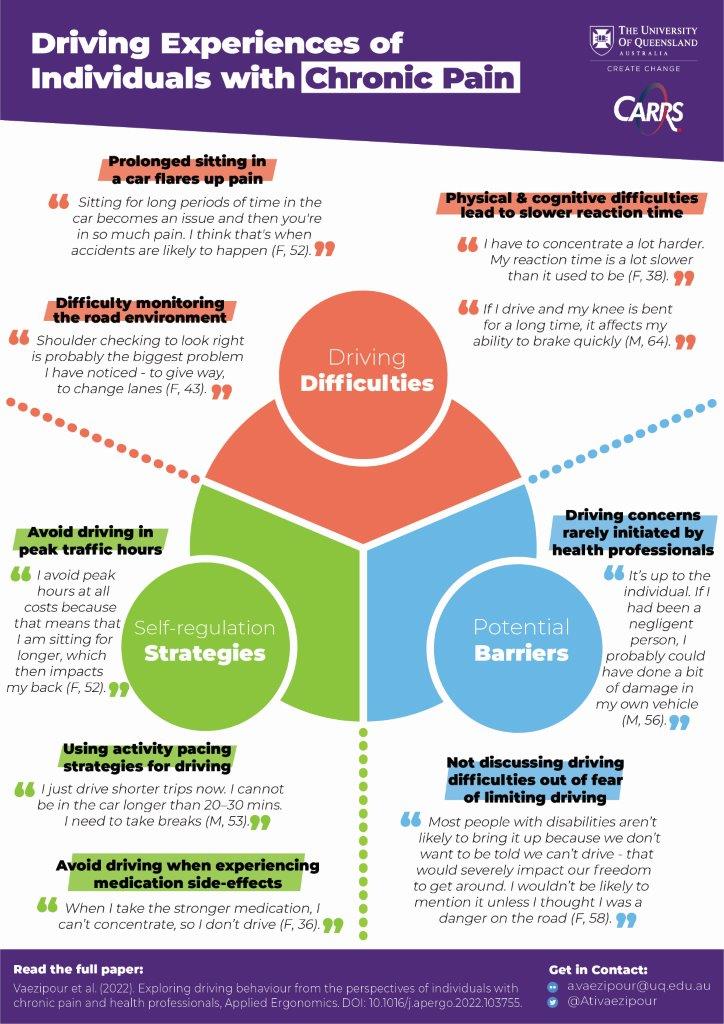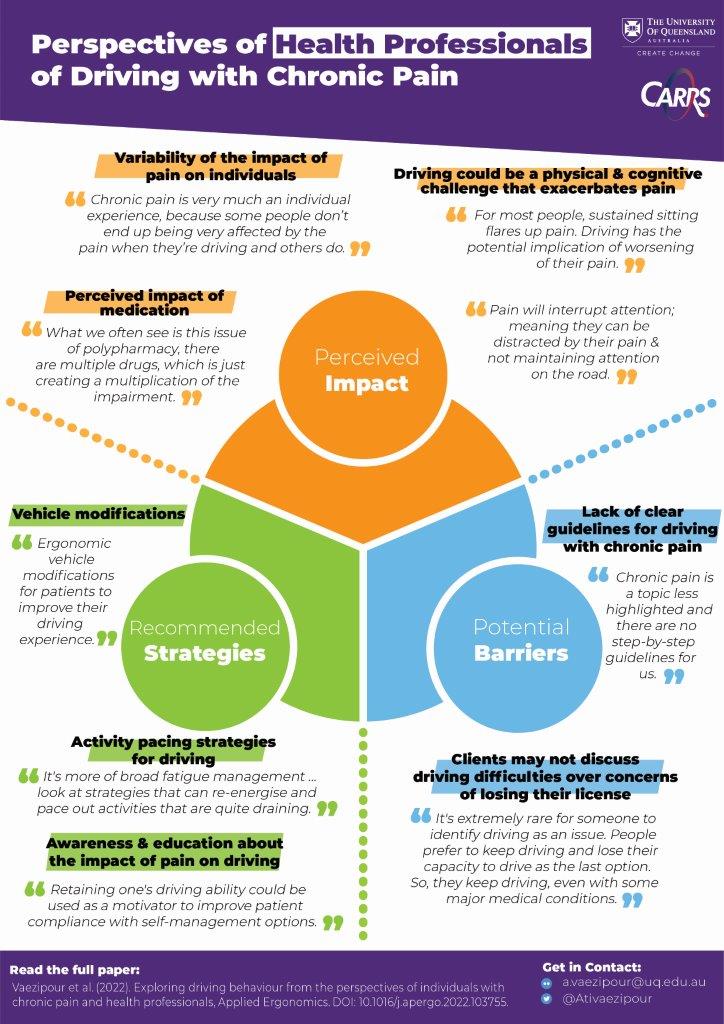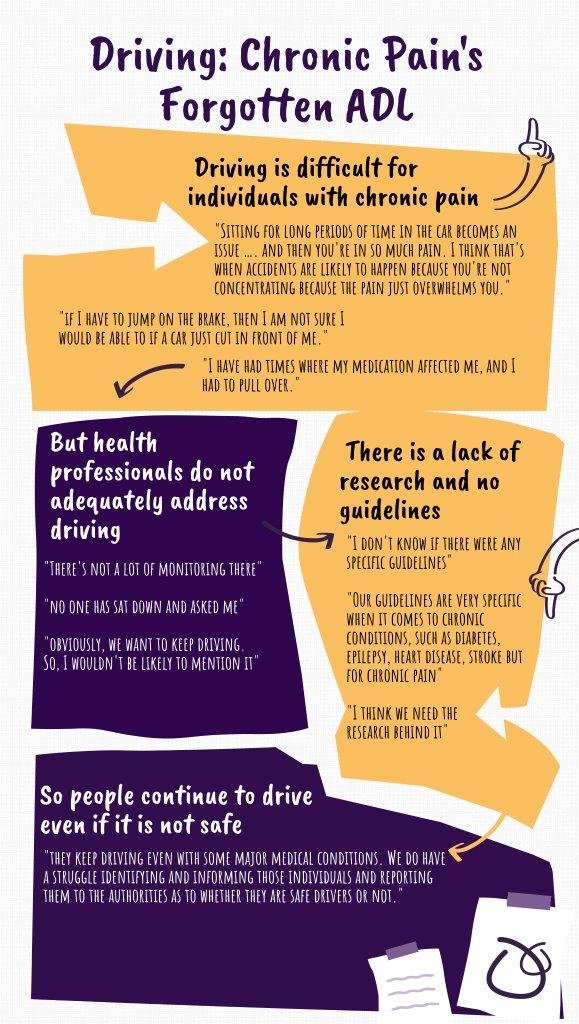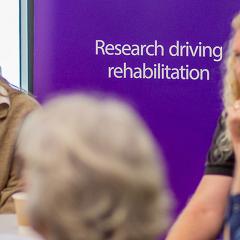What is the research about?
Chronic pain affects one in five Australians, and this could impact daily activities such as driving. Driving is a complex task, which requires the cognitive and physical ability to predict, identify, and respond to hazards to avoid crashing. However, research exploring the factors that influence safe driving behaviour for people with chronic pain is limited. This research aimed to obtain a deeper understanding of the experiences and challenges that individuals with chronic pain may have in their day-to-day driving to identify avenues for research and more effective treatment.
What did the researchers do?
A qualitative study was conducted which involved semi-structured interviews with 23 people who had experienced persistent pain for at least three months and 17 health professionals who had experience working with individuals with chronic pain. These interviews were conducted to provide insight into (1) driving difficulties experienced by individuals with chronic pain, (2) the current model of care for driver rehabilitation in Australia, (3) the driving-related treatment or adaptation strategies that individuals with chronic pain have found useful and (4) the barriers and enablers associated with adequately addressing the driving challenges experienced by the chronic pain population.
What you need to know:
The findings from the interviews highlighted the need for clearer guidelines and educational materials regarding the impact of chronic pain on an individual's ability to drive. These included the physical and cognitive challenges resulting from chronic pain, as well as the potential side effects of pain medications.
Participants also identified a number of self-regulation strategies and driving assessments currently available for monitoring safe driving behaviour in Australia. However, this study broadly highlighted health professionals' views on the lack of evidence for self-regulation strategies beyond medication management.
What did the researchers find?
Chronic pain and health professional participants highlighted that driving-related prolonged sitting and repetitive movements could exacerbate chronic pain. This means that driving could create challenges for managing pain and/or increase consumption of pain medication affecting the quality of life and health outcomes of individuals experiencing chronic pain.
Participants who experience chronic pain reported that their pain changes their driving performance, including increased difficulty monitoring the road environment, slower reaction times, occurrence of distracting mental states, and poor vehicle control. Health professionals also considered driving a cognitively demanding task that may be directly or indirectly be compromised due to chronic pain. Effects included impaired cognition due to distraction caused by pain and poor quality of sleep before driving, both common occurrences among chronic pain cohorts.
In conclusion, these findings provide insight into how chronic pain may negatively impact driving. Some of the issues emerging from our findings relate specifically to the variability of chronic pain, including type, location, the severity of pain and its effects on an individual's driving performance. In addition, the lack of evidence-based research and clear guidelines makes it challenging for health professionals to assess driving in short clinical timeframes.
Posters showing summary findings



How can you use this research?
This study improves our understanding of how chronic pain affects driving behaviour, as reported by individuals experiencing the pain and relevant health professionals. Recommendations for improving the safety of drivers with chronic pain are discussed, including possible technological interventions and better public education. Future research could investigate the effectiveness and safety of self-regulation strategies currently adopted by drivers experiencing chronic pain, including the use of advanced driver support systems. Such research could contribute to developing clear guidelines, public education and identifying specific strategies that relate to the successful management of safe driving among chronic pain cohorts.
About the researchers
Dr Atiyeh Vaezipour is a is a Research Fellow at RECOVER Injury Research Centre at The University of Queensland.
Dr Nicole Andrews is a Research Fellow at RECOVER Injury Research Centre at The University of Queensland and an occupational therapist at the Tess Cramond Pain and Research Centre.
Dr Oscar Oviedo-Trespalacios is a senior research fellow at the Queensland University of Technology.
Ms Fatima Amershi is an occupational therapist at the Tess Cramond Pain and Research Centre.
Professor Mark Horswill works at the School of Psychology at the University of Queensland.
Associate Professor Venerina Johnston is an Honorary Associate Professor at the University of Queensland.
Professor Patricia Delhomme is a research director in the Laboratory of Applied Psychology and Ergonomics at Université Gustave Eiffel.
Citation
Vaezipour, A., Andrews, N., Oviedo-Trespalacios, O., Amershi, F., Horswill, M., Johnston, V., & Delhomme, P. (2022). Exploring driving behaviour from the perspectives of individuals with chronic pain and health professionals. Applied Ergonomics, 102, 103755. https://doi.org/10.1016/j.apergo.2022.103755
Keywords
Chronic pain; self-management; driving behaviour, distracted driving, self-regulation strategies; driving assessment
Contact information, acknowledgements

a.vaezipour@uq.edu.au – Corresponding author
@AtiVaezipour – Twitter
The authors wish to thank all participants and staff who shared their valuable insight in this project.



